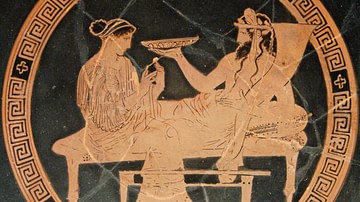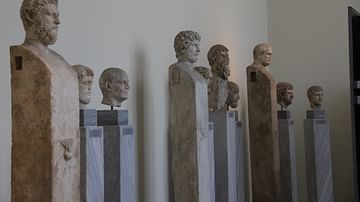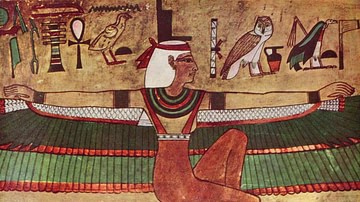Search
Search Results

Image
The Frescoes of the Villa of the Mysteries in Pompeii
The Villa of the Mysteries in Pompeii owes its fame to the exquisite wall paintings that cover the walls of one of its reception rooms. A mysterious scene with life-size figures in the Second Pompeian Style seems to depict the initiation...

Article
The Eleusinian Mysteries and the Bee
The fifth century BCE Greek historian Herodotus relates the importance of bees in ancient Greece, pointing out that the honey of neighboring countries was made using fruit, while the honey of the Greeks was produced by bees. The significance...

Image
Cult Relief of the Mithraic Mysteries
Mithras looks away from the dying bull, up to the moon. Also, Mithras has a few little helpers that accompany him in taking the bull's fertility: a dog and a snake drink from the bull's blood, and a scorpion stings the bulls scrotum. A raven...

Video
Ancient Mysteries Dreamtime of the Aboriginals Documentary
The Aboriginals of Australia (INCREDIBLE ANCIENT HISTORY DOCUMENTARY) Frontier is considered television's first comprehensive account of Australia's . Aboriginal Theology - Ancient Mysteries - Dreamtime of the Aboriginals (1998) See Full...

Definition
Persephone
Persephone (aka Kore) was the Greek goddess of agriculture and vegetation, especially grain, and the wife of Hades, the ruler of the Underworld. Persephone was an important element of the Eleusinian Mysteries and the Thesmophoria festival...

Video
Villa of Mysteries
More free lessons at: http://www.khanacademy.org/video?v=SEzDiejb1a0
Dionysian Cult Cycle (?), Villa of Mysteries, before 79 C.E., fresco, Pompeii,
Speakers: Dr. Beth Harris and Dr. Steven Zucker

Video
What is Stonehenge? The Mysteries of the Neolithic Stone Circle
Stonehenge is a stone circle that dates back to the Neolithic period, in c. 3000 BCE on the Salisbury Plain, Wiltshire in Southern England. It wasn’t a site built in the late Neolithic period which then sat stagnant for five thousand years...

Definition
Samothrace
Samothrace (Samothrake) is a Greek island in the northern Aegean which was prominent from the Classical period as a member of the Delian League. Its greatest claim to fame was as a cult centre favoured by Macedon and visited by pilgrims from...

Article
The Desecration of the Statues of Hermes, 415 BCE
On 7 June 415 BCE, various statues of the god Hermes were desecrated in Athens. The Peloponnesian War (431-404 BCE) had been raging for decades as one of the biggest civil wars in Ancient Greece, and the Athenians prepared for the expedition...

Definition
Isis
Isis is an ancient Egyptian goddess who became the most popular and enduring of all the Egyptian deities. Her name comes from the Egyptian Eset, ("the seat") which referred to her stability and also the throne of Egypt as she was considered...